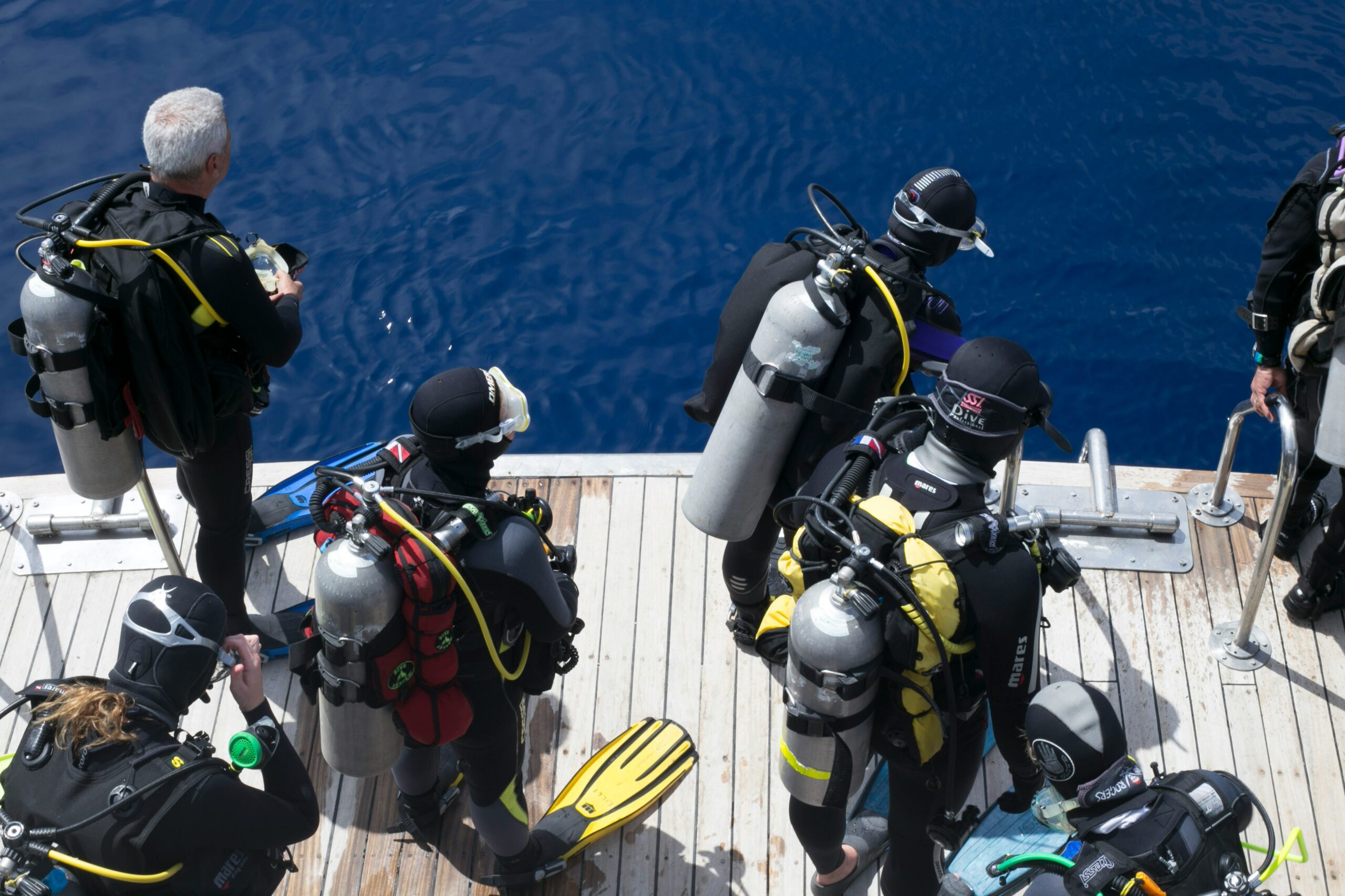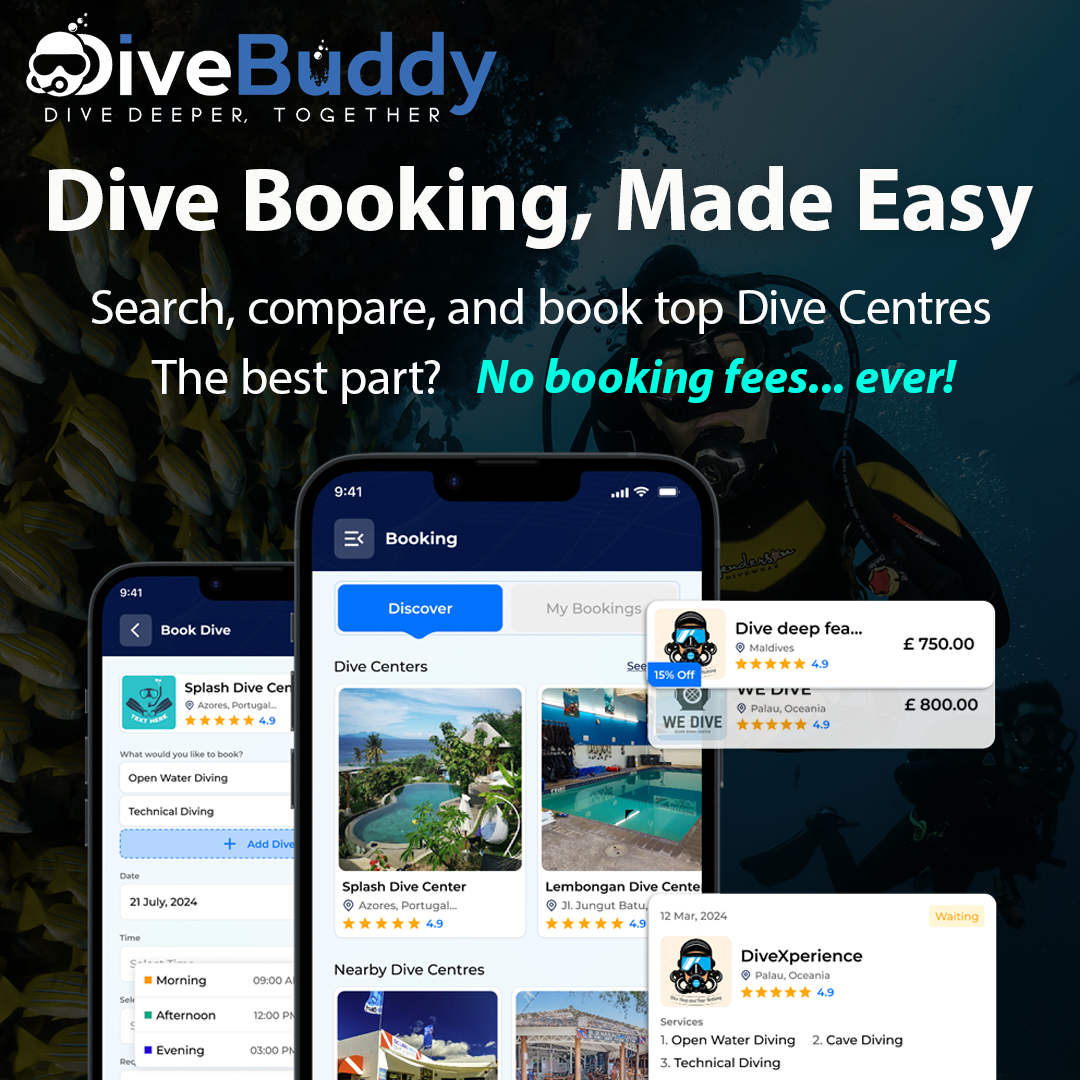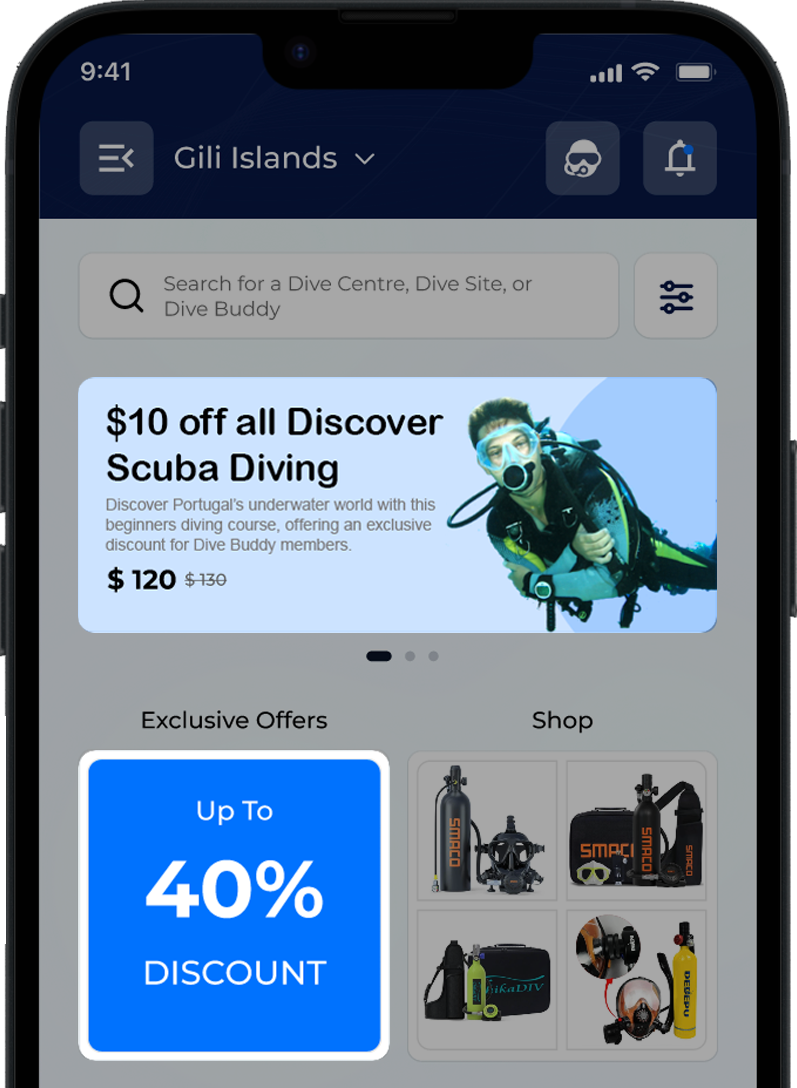
Here’s a quick overview of the most popular agencies for beginner divers:
PADI (Professional Association of Diving Instructors)
As the world’s largest diving organisation, PADI is a household name in the scuba community. It offers a highly structured training program with courses available in nearly every country. PADI’s digital learning options make it convenient to complete the theory portion of your certification online, and their global presence ensures you’ll have no trouble finding dive centres and instructors wherever you go. Their certifications are particularly valuable for divers who plan to travel frequently, as they’re widely recognised and accepted by dive operators worldwide.
• Entry Course: PADI Open Water Diver – Dive to 18m (60ft).
• Best For: Divers who want a globally accepted certification, especially for travel.
SSI (Scuba Schools International)
SSI is known for its innovative approach to dive training. The organisation offers a robust digital platform that allows students to learn at their own pace, with access to interactive materials and videos. SSI’s pricing is often more competitive than other agencies, and their modular approach means you can customise your learning experience to match your goals. While their certifications are globally accepted, they’re particularly popular in regions with a strong emphasis on modern, flexible education.
• Entry Course: SSI Open Water Diver – Dive to 18m (60ft).
• Best For: Those looking for a modern, flexible learning approach.
NAUI (National Association of Underwater Instructors)
NAUI has a reputation for being one of the most safety-focused and education-intensive agencies in the industry. Founded in 1960, it’s one of the oldest training organisations and is well-respected for its emphasis on building independent, confident divers. NAUI instructors often have more freedom to adapt the curriculum to individual student needs, making it a great choice for those who value a personalised learning experience. While not as globally ubiquitous as PADI, NAUI certifications are widely respected.
• Entry Course: NAUI Scuba Diver – Dive to 18m (60ft).
• Best For: Divers who want a strong focus on safety and education.
BSAC (British Sub-Aqua Club)
BSAC stands out for its community-driven approach to diving. As the UK’s national governing body for recreational diving, BSAC offers a club-based model where members receive mentorship and ongoing training opportunities. Their courses are designed to foster camaraderie and long-term involvement, making it an excellent choice for divers looking to build strong connections within a diving community. Though their certifications are most recognised in the UK, BSAC divers are welcomed by operators around the world.
• Entry Course: BSAC Ocean Diver – Dive to 20m (65ft).
• Best For: UK-based divers seeking a club environment and ongoing mentorship.
SDI (Scuba Diving International)
SDI is a forward-thinking agency that integrates modern technology into its training programs. Their courses focus on practical skills and often introduce the use of dive computers earlier than other organisations. SDI is also known for its no-nonsense, streamlined approach, making it a popular choice for those who want to become certified quickly and effectively. With a strong emphasis on safety and technology, SDI appeals to divers who prefer a contemporary learning style.
• Entry Course: SDI Open Water Diver – Dive to 18m (60ft).
• Best For: Tech-savvy divers and those who prefer streamlined, practical training.
| Training Agency | Beginners Course | Depth Limit | Learning Style | Global Recognition |
| PADI | Open Water Diver | 18m (60ft) | Structured with digital options | Excellent |
| SSI | Open Water Diver | 18m (60ft) | Flexible with digital learning | Excellent |
| NAUI | Scuba Diver | 18m (60ft) | Safety-focused and traditional | Very Good |
| BSAC | Ocean Diver | 20m (65ft) | Club-based with slower progression | Good (strong in UK) |
| SDI | Open Water Diver | 18m (60ft) | Tech-focused, with a modern approach | Very Good |
Here are key factors to help you decide:
Where do you plan to train? PADI and SSI are the most widely available worldwide, while BSAC is popular in the UK.
• PADI and SSI offer user-friendly digital learning options.
• BSAC provides community support through clubs, ideal for social learning.
• SDI emphasises using modern tools like dive computers from the start.
• If you want to dive internationally, choose an agency with global recognition like PADI or SSI.
• If you’re UK-based and enjoy a club environment, BSAC is ideal.
• For a focus on safety and independence, NAUI is an excellent choice.
Dive Buddy Tip: Use the Dive Buddy app to easily search for dive centers offering training courses from PADI, SSI, BSAC, NAUI, or SDI in your area or at popular dive destinations.

At the beginner level, all agencies follow similar standards to ensure you learn to dive safely. The differences lie more in teaching style, availability, and long-term opportunities. What matters most is:
The Instructor: A good instructor makes all the difference in building your skills and confidence underwater.
The Dive Center: Find a centre that feels professional, supportive, and well-reviewed.
Dive Buddy Tip: Check the Dive Buddy app to find trusted dive centers, compare training options, and even discover exclusive offers to make your certification more affordable. Explore all Dive Buddy features
Ask Questions: Don’t hesitate to ask dive centres about class sizes, costs, and course schedules.
Check Reviews: Look for positive feedback about instructors and the overall training experience.
Use Dive Buddy: Discover the best dive centers near you, compare certifications, and find deals on courses with just a few taps.
Choosing the right diver training organisation is just the beginning of your underwater adventure. Whether you go with PADI, SSI, NAUI, or another agency, the key is to start with confidence and excitement. Download Dive Buddy today to find the perfect dive center, explore beginner scuba diving courses, and kickstart your journey to becoming a certified diver.
Curious about what your first dive will be like? Check out our post on What to Expect on Your First Dive to learn about the gear, skills, and underwater adventures that await you as a new diver!
The ocean is waiting—take the plunge!
Yes, most agencies have similar standards for entry-level certifications, making it relatively easy to switch. For example, if you start with a PADI Open Water Diver certification, you can still take advanced courses with SSI, SDI, or another agency. However, some courses may require a referral or bridging process, so check with the dive centre in advance.
Not all certifications have the same level of global recognition. PADI and SSI are the most widely accepted, especially for recreational diving. BSAC certifications are strong in the UK, while NAUI and SDI are highly respected but slightly less common in some regions. Consider your diving goals and preferred locations when choosing.
The duration varies by agency and course format. Most entry-level certifications take 3–4 days if done in person, or longer if you choose a flexible schedule with digital learning. Some agencies, like SSI and PADI, allow you to complete the theory portion online before your practical sessions.
A great instructor is patient, supportive, and experienced. They should make you feel confident and safe throughout the training. Check reviews on platforms like Dive Buddy to find highly rated instructors in your area.
Absolutely! The Dive Buddy app lets you search for dive centres worldwide, compare training options, and discover exclusive offers. It’s an excellent tool for finding the right course for your needs.
No, most dive centres provide all the necessary equipment for beginner courses. However, owning your own mask, snorkel, and fins can make your experience more comfortable and personalized. Dive Buddy can help you find discounts on gear through exclusive offers.
If you’re unable to finish the course (due to time, weather, or other reasons), many dive centres offer referral programs. This allows you to transfer your completed portions to another centre or instructor to finish at a later date.
Yes, scuba diving is safe when you’re properly trained and follow the rules. All agencies teach safety fundamentals in their beginner courses, ensuring you’re prepared for underwater adventures.
and join the waitlist for FREE lifetime access plus your limited edition membership card!
Access Deals from Top Brands Only For Dive Buddy Members

Partner with Dive Buddy and add offer exclusive offers on products and services, only for Dive Buddy members.

Join the waitlist
Join the Dive Buddy waitlist to be notified when the app is ready to download. By joining now you will receive FREE Lifetime Access and a Limited Edition Membership Card!